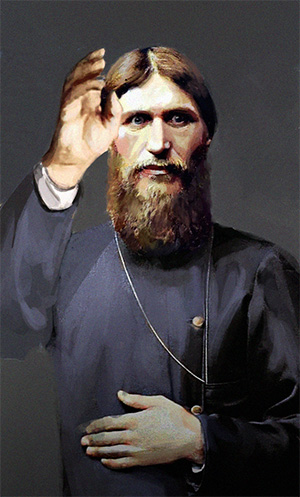Grigori Rasputin

Grigori Yefimovich Rasputin (Russian: Григорий Ефимович Распутин) (21 January 1869 – 30 December 1916) was a Russian mystic and self-proclaimed holy man who befriended the family of Nicholas II, the last Emperor of Russia, and gained considerable influence in late Imperial Russia.
Early life
Rasputin was born to a peasant family in the Siberian village of Pokrovskoye in the Tyumensky Uyezd of Tobolsk Governorate (now Yarkovsky District of Tyumen Oblast). He had a religious conversion experience after taking a pilgrimage to a monastery in 1897. He has been described as a monk or as a "strannik" (wanderer or pilgrim), though he held no official position in the Russian Orthodox Church.
By the early 1900s, Rasputin had developed a small circle of followers, primarily family members, and other local peasants, who prayed with him on Sundays and other holy days when he was in Pokrovskoye. Building a makeshift chapel in Efim's root cellar—Rasputin was still living within his father's household at the time—the group held secret prayer meetings there. These meetings were the subject of some suspicion and hostility from the village priest and other villagers. It was rumored that female followers were ceremonially washing him before each meeting, that the group sang strange songs, and even that Rasputin had joined the Khlysty, a religious sect whose ecstatic rituals were rumored to include self-flagellation and sexual orgies.
Service to the Tsar
Alternative religious movements such as spiritualism and theosophy had become popular among the city's aristocracy before Rasputin's arrival in St. Petersburg, and many of the aristocracy were intensely curious about the occult and the supernatural. Rasputin traveled to Saint Petersburg in 1903 or the winter of 1904–1905, where he captivated some church and social leaders. He became a society figure and met Tsar Nicholas II and Tsarina Alexandra in November 1905.
In late 1906, Rasputin began acting as a healer for the imperial couple's only son, Alexei, who suffered from hemophilia. He was a divisive figure at court, seen by some Russians as a mystic, visionary, and prophet, and by others as a religious charlatan. The high point of Rasputin's power was in 1915 when Nicholas II left St. Petersburg to oversee Russian armies fighting World War I, increasing both Alexandra and Rasputin's influence. Russian defeats mounted during the war, however, and both Rasputin and Alexandra became increasingly unpopular.
Death
A group of nobles led by Prince Felix Yusupov, Grand Duke Dmitri Pavlovich, and right-wing politician Vladimir Purishkevich decided that Rasputin's influence over the tsarina threatened the empire, and they concocted a plan in December 1916 to kill him, apparently by luring him to the Yusupovs' Moika Palace. Rasputin was murdered during the early morning on 30 December 1916 at the home of Felix Yusupov. He died of three gunshot wounds, one of which was a close-range shot to his forehead. Little is certain about his death beyond this, and the circumstances of his death have been the subject of considerable speculation.
Yusupov said he invited Rasputin to his home shortly after midnight and ushered him into the basement. Yusupov offered Rasputin tea and cakes which had been laced with cyanide. Rasputin initially refused the cakes but then began to eat them and, to Yusupov's surprise, appeared unaffected by the poison. Rasputin then asked for some Madeira wine (which had also been poisoned) and drank three glasses, but still showed no sign of distress. At around 2:30 am, Yusupov excused himself to go upstairs, where his fellow conspirators were waiting. He took a revolver from Dmitry Pavlovich, then returned to the basement and told Rasputin that he'd "better look at the crucifix and say a prayer", referring to a crucifix in the room, then shot him once in the chest.
The conspirators then drove to Rasputin's apartment, with Sukhotin wearing Rasputin's coat and hat in an attempt to make it look as though Rasputin had returned home that night. Upon returning to the Moika Palace, Yusupov went back to the basement to ensure that Rasputin was dead. Suddenly, Rasputin leaped up and attacked Yusupov, who freed himself with some effort and fled upstairs. Rasputin followed Yusupov into the palace's courtyard, where he was shot by Purishkevich. He collapsed into a snowbank. The conspirators then wrapped his body in cloth, drove it to the Petrovsky Bridge, and dropped it into the Malaya Nevka River.
Legacy
Historians often suggest that Rasputin's scandalous and sinister reputation helped discredit the tsarist government and thus helped precipitate the overthrow of the Romanov dynasty a few weeks after he was assassinated. Accounts of his life and influence were often based on hearsay and rumor.